I’m on record hailing Ukrainians as my favorite ex-communists. Alas, I’m also on record lamenting that, ever since their triumphal Orange Revolution in 2005, they have done nothing but trample all over my hopes for the political development of their country.
Just two years after that revolution, which was supposed to set them on an inexorable path towards a thriving democracy, it became agonizingly clear that Ukrainians are more divided among themselves than they ever were with the Russians who once lorded over them.
No American politician could have anticipated the obsession fractious Ukrainians evidently developed for elections after their split from the former Soviet Union. After all, Sunday’s national poll was the third in three years, which puts the Ukrainians on track to make the Italians’ promiscuous penchant for changing governments seem positively chaste.
(“My Favorite Ex-Communists: the Ukrainians,” The iPINIONS Journal, October 2, 2007)
Specifically, Ukrainians have been beset by irreconcilable differences between Ukrainian-speaking citizens in the West – who long for their country to be fully integrated into Europe, and Russian-speaking citizens in the East – who long for it to rekindle Cold War ties with Russia.
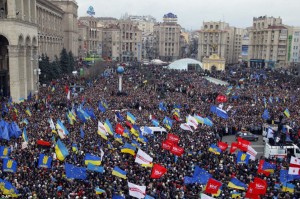 Which is why there’s a Groundhog-Day spectacle about the latest protests, which began 10 days ago, to bring down yet another Ukrainian government:
Which is why there’s a Groundhog-Day spectacle about the latest protests, which began 10 days ago, to bring down yet another Ukrainian government:
Ukrainian protesters blockaded the main government building on Monday, trying to bring down President Viktor Yanukovych with a general strike after hundreds of thousands demonstrated against his decision to abandon an EU integration pact.
Demonstrations on Saturday and Sunday, which saw violent clashes with the police, drew as many as 350,000 people, the biggest public rally in the ex-Soviet state since the ‘orange revolution’ overturned a stolen election nine years ago.
Yanukovych’s decision to abandon a trade pact with the European Union and instead seek closer economic ties with Russia has stirred deep passions in a country where many people yearn to join the European mainstream and escape Moscow’s orbit.
(Reuters, December 2, 2013)
Only God knows how this will turn out. But I would bet my life savings on Ukraine ending up in Europe; even if Russian President Vladimir Putin tries, again, to freeze it out and extort its loyalty by cutting off the gas Russia supplies – not just to Ukraine but many countries in Europe, including France and Germany.
All the same, it would not surprise me in the least if Putin does to Ukraine what he did to Georgia; namely, deploy troops to cut off the pro-Russian parts of the country….
In the meantime, I shall suffice to share excerpts from just a few of my previous commentaries, in chronological order, that should explain why Ukrainians seem caught in a vicious cycle of political unrest.
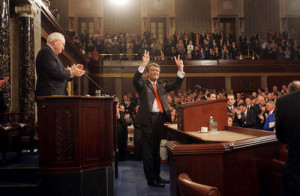 From “Viktor Yushchenko Comes to Washington,” (April 7, 2005):
From “Viktor Yushchenko Comes to Washington,” (April 7, 2005):
Yesterday, the newly elected president of Ukraine, Viktor Yushchenko, received a hero’s welcome before addressing a Joint Session of the United States Congress. Yushchenko thanked President George W. Bush for standing firm in his support for Ukraine’s peaceful Orange Revolution and vowed to build a resolutely American-style democracy in heart of the old Soviet Union.
From “Putin Fires First Salvo in New Cold War in Europe,” (January 3, 2006):
Putin made Ukrainian President Viktor Yushchenko an offer he could not refuse: Like a true dictator, Putin told Yushchenko that if Ukraine’s 47 million ‘orange revolutionaries’ wanted to continue receiving gas from Russia to cook their food, heat their homes, and drive their cars, they would have to pay four times as much. When Yushchenko refused, Putin made good on his threat and cut off the gas supply!
 [Incidentally, it should have come as no surprise when Bloomberg published a September 17, 2013 report headlined, “Vladimir Putin, the Richest Man on Earth” – with an estimated fortune of $40-60 billion. And bear in mind that he comes from peasant stock and has never held a non-government job in his life.
[Incidentally, it should have come as no surprise when Bloomberg published a September 17, 2013 report headlined, “Vladimir Putin, the Richest Man on Earth” – with an estimated fortune of $40-60 billion. And bear in mind that he comes from peasant stock and has never held a non-government job in his life.
But the reason Putin is now the richest, and arguably the most powerful, man on earth is that, in addition to using Russia’s vast oil and gas resources as political weapons, he has been using them as personal commodities to enrich himself ever since his first term as president in 2000. Most notoriously, this included confiscating the oil company of Russia’s richest man, Mikhail Khodorkovsky, and throwing him in the gulag in 2003, where he’s still rotting away to this day.]
From “Update on My Favorite Ex-Communists,” (October 2, 2007):
Only months after his election, Yushchenko’s myriad failures as a leader became so untenable that many erstwhile ‘orange revolutionaries’ (i.e., Ukrainians who risked their lives to support his call for democracy) were already pining for a return to communist rule.
In fact, Yushchenko spent so much time trying to manage the grandiose ambitions of his government ministers that he was utterly incapable of delivering on any of his election promises: most notably, to eradicate corruption, establish fiscal transparency, and set Ukraine on a path towards sustainable economic development.
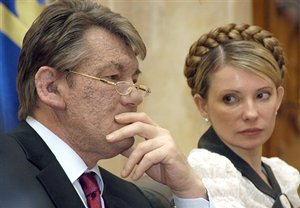 It was not surprising, therefore, that Yushchenko’s most decisive act as president was sacking Yulia Tymoshenko – the charismatic woman he appointed prime minister and who, to his understandable chagrin, many Ukrainians thought personified the spirit of the Orange Revolution.
It was not surprising, therefore, that Yushchenko’s most decisive act as president was sacking Yulia Tymoshenko – the charismatic woman he appointed prime minister and who, to his understandable chagrin, many Ukrainians thought personified the spirit of the Orange Revolution.
Unfortunately, this only deepened disaffection with his leadership and exacerbated the democratic growing pains of all Ukrainians. And to make matters worse, instead of going quietly, Tymoshenko led a mutiny against him, which caused their governing coalition to crumble in abject failure.
This in turn led to new elections held in March 2006, which resulted in the improbable return to power of unreformed communists led by Viktor Yanukovych – the man Yushchenko claims headed the Russian-inspired attempt to assassinate him.
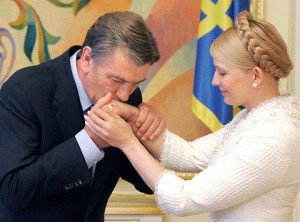 From “Update on My Favorite Ex-Communists,” (September 24, 2008):
From “Update on My Favorite Ex-Communists,” (September 24, 2008):
There were great expectations last year that the gunshot re-marriage between President Viktor Yushchenko and Prime Minister Yulia Tymoshenko, the two leaders of Ukraine’s democratic forces, would last. But I was more cynical. In fact, despite writing that ‘perhaps this third time will prove a charm,’ I ended last year’s update as follows:
‘Chances are even better, however, that I’ll be writing a similar update a year from now after another round of elections are called to end yet another period of political deadlock….’
And, sure enough, here I am.
It is noteworthy, however, that this third divorce was caused by far more than persistent irreconcilable differences between Yushchenko and Tymoshenko. Because it was triggered by Tymoshenko’s refusal to stand by Yushchenko when he went out on a limb in June to support another ex-communist, Georgian President Mikhail Saakashvili, in his failed attempt to oust Russian forces from his country.
Yushchenko claims that Tymoshenko not only betrayed him (and Ukraine’s democratic forces) but was actually plotting ‘a political and constitutional coup d’etat’ by joining Viktor Yanukovych, the leader of Ukraine’s pro-Russian party, in accusing Georgia’s democratic forces of provoking the Russian invasion.
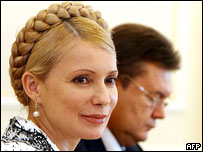 From “Alas, Most Ukrainians Believe in Constant Change, if Not in Chaos,” (March 4, 2010):
From “Alas, Most Ukrainians Believe in Constant Change, if Not in Chaos,” (March 4, 2010):
Well, it’s little more than a year, but this latest update brings more of the same. Because, after joining forces to utterly frustrate Yushchenko’s presidency, Tymoshenko and Yanukovych began plotting against each other immediately to replace him.
This led to new presidential elections last month, which resulted in Yanukovych defeating Tymoshenko. Yet, true to form, this latest change has only ushered in a new term of political chaos and dysfunction.
In this case, just as she defied Yushchenko, Tymoshenko defied Yanukovych’s demands for her to resign as prime minister so that he could appoint someone whose sole ambition was not to take his job…
This means that Ukraine is probably in for another round of snap parliamentary elections before summer. And so it goes….
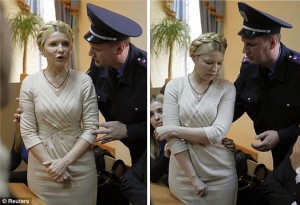 From “Rise and Fall of Ukraine’s Yulia Tymoshenko,” (October 14, 2011):
From “Rise and Fall of Ukraine’s Yulia Tymoshenko,” (October 14, 2011):
A judge sentenced former Prime Minister Yulia Tymoshenko to seven years in prison for abusing her powers, by signing a sweetheart oil deal with Russia, while in office. And to compound her woes, the state security service filed additional corruption charges against her only yesterday, claiming that she misappropriated over $400 million from the government’s budget to pay off a debt owed to Russia by an energy company she once ran…
Tymoshenko denies everything of course, claiming that she’s being persecuted for her political beliefs by Ukraine’s unrepentant communist president, Viktor Yanukovych. Whatever the case, these new charges mean that she could end up spending the rest of her life in prison.
Mind you, such a fate would be entirely in keeping with the Joan-of-Arc persona she has cultivated over the years. And she will doubtless spin her imprisonment as martyrdom for the noble cause of Ukrainian democracy, which she and her fellow Orange Revolutionaries were mandated to usher in six years ago.
Never mind that all of her former political partners would probably describe her as more of a cross between Mata Hari and the Black Widow; and that her imprisonment is her just deserts…
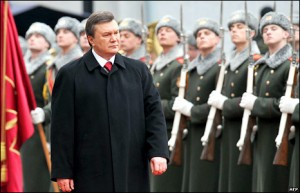 Clearly, when all is said and done, Tymoshenko is learning the hard way that the difference between a Democratic president like Yushchenko and a Communist one like Yanukovych is that the former just fires public servants who refuse to carry out his political agenda; the latter throws them in prison.
Clearly, when all is said and done, Tymoshenko is learning the hard way that the difference between a Democratic president like Yushchenko and a Communist one like Yanukovych is that the former just fires public servants who refuse to carry out his political agenda; the latter throws them in prison.
This brings us full circle – with former Orange Revolutionaries fighting to overthrow the pro-Russian Yanukovych once again.
‘Our plan is clear: It’s not a demonstration; it’s not a reaction; it’s a revolution,’ said Yuriy Lutsenko, a former interior minister who is now an opposition leader.
(The Associated Press, December 1, 2013)
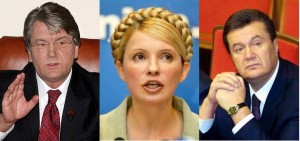 Never one to be sidelined during a national fight, Tymoshenko went on a hunger strike in solidarity with these anti-government protesters. She’s in her eighth day and is probably wondering why the international media are spending more time covering their protests than her strike.
Never one to be sidelined during a national fight, Tymoshenko went on a hunger strike in solidarity with these anti-government protesters. She’s in her eighth day and is probably wondering why the international media are spending more time covering their protests than her strike.
For his part, Yushchenko led negotiations with European leaders to formulate terms for Ukraine’s Association Agreement with Europe, which Yanukovych balked at signing at the eleventh hour (showing himself more fearful of Russia’s cold shoulder than solicitous of Europe’s warm embrace).
Thus continues the political triangle among these three, which has only reinforced Ukraine’s reputation of being either a Russian lapdog or an ungovernable mess ever since its disassociation from the Soviet Union in 1991.
Related commentaries:
Rise and fall of Tymoshenko…